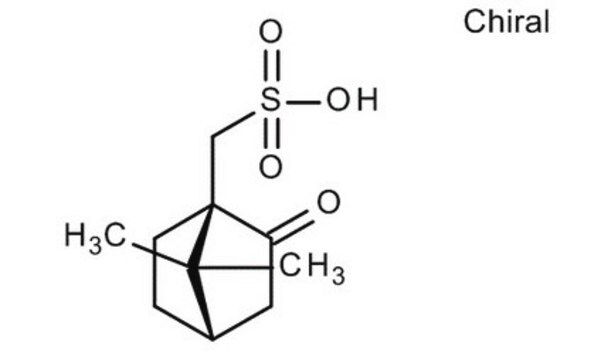282146
(1R)-(−)-10-Camphorsulfonic acid
98%
Synonym(s):
(−)-Camphor-10-sulfonic acid, (1R)-(−)-Camphor-10-sulfonic acid, (1R)-Camphor-10-sulfonic acid
About This Item
Recommended Products
Assay
98%
optical activity
[α]20/D −21°, c = 2 in H2O
mp
198 °C (dec.) (lit.)
SMILES string
[H][C@]12CC[C@](CS(O)(=O)=O)(C(=O)C1)C2(C)C
InChI
1S/C10H16O4S/c1-9(2)7-3-4-10(9,8(11)5-7)6-15(12,13)14/h7H,3-6H2,1-2H3,(H,12,13,14)/t7-,10-/m0/s1
InChI key
MIOPJNTWMNEORI-XVKPBYJWSA-N
Looking for similar products? Visit Product Comparison Guide
Related Categories
General description
Application
Signal Word
Danger
Hazard Statements
Precautionary Statements
Hazard Classifications
Eye Dam. 1 - Skin Corr. 1B
Storage Class Code
8A - Combustible corrosive hazardous materials
WGK
WGK 3
Flash Point(F)
Not applicable
Flash Point(C)
Not applicable
Personal Protective Equipment
Certificates of Analysis (COA)
Search for Certificates of Analysis (COA) by entering the products Lot/Batch Number. Lot and Batch Numbers can be found on a product’s label following the words ‘Lot’ or ‘Batch’.
Already Own This Product?
Find documentation for the products that you have recently purchased in the Document Library.
Our team of scientists has experience in all areas of research including Life Science, Material Science, Chemical Synthesis, Chromatography, Analytical and many others.
Contact Technical Service







